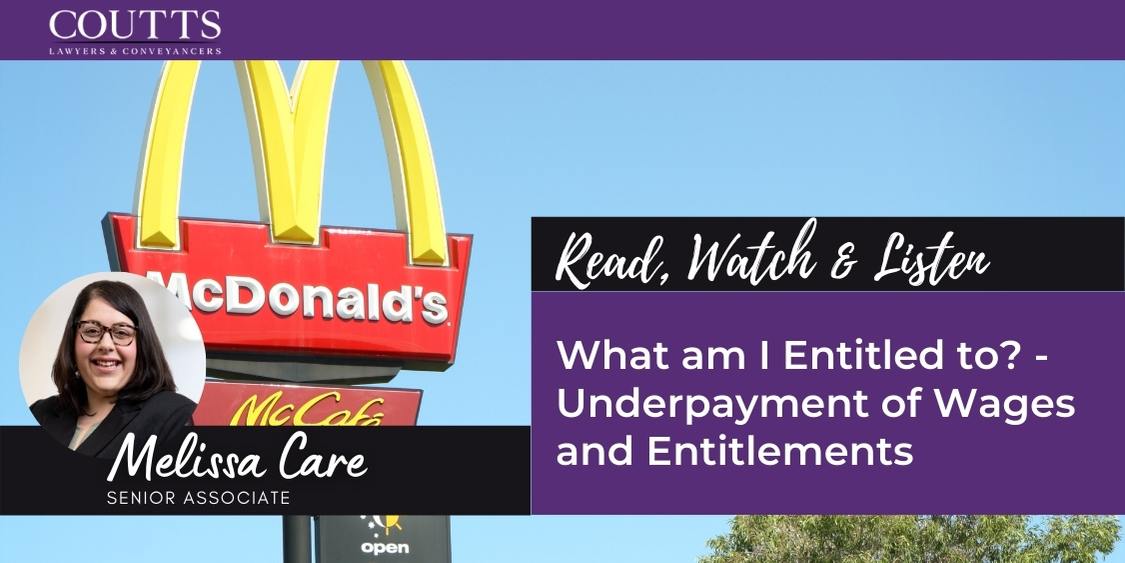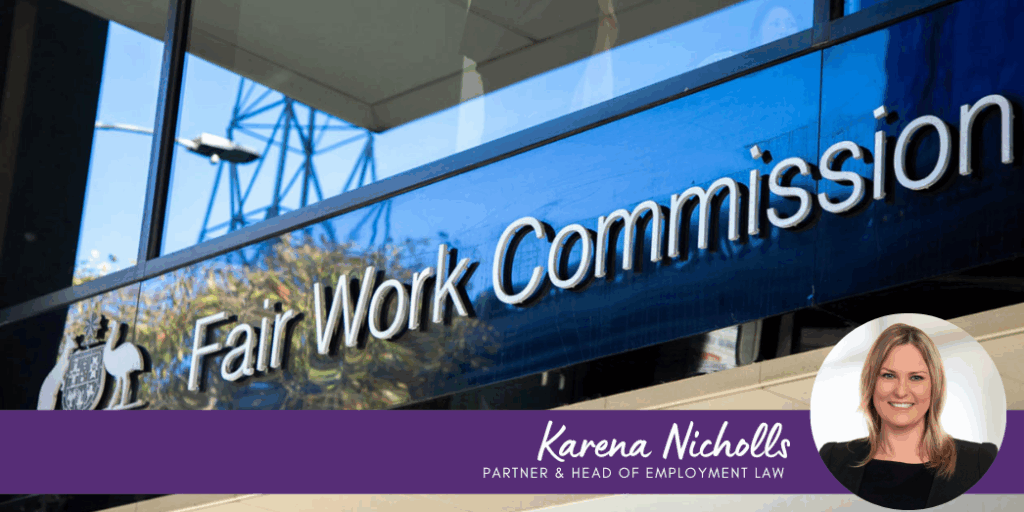KEY TAKE-OUTS:
- Wages and Employment entitlements are accrued in accordance with relevant awards, enterprise agreements and employment agreements
- Employees are entitled to set breaks depending on the number of hours they have worked. Employment agreements will outline the minimum amount of time off allowed during a shift.
- Sometimes employers may unknowingly or wilfully underpay wage entitlements. It is important to raise these issues with your employer or seek legal advice to rectify any underpayments.
- McDonald’s Australia has recently come under fire for underpayment of employee’s wages and over not providing paid rest breaks to workers. The claims are currently before the Federal Court.
What are Employment Entitlements?
Wages and employment entitlements are accrued in accordance with an employee’s award, enterprise agreement or employment agreement. They also vary depending on the age, industry, qualifications and work duties and responsibilities of each employee.
All employees in Australia are entitled to a minimum wage and the 11 National Employment Standards (NES), although casual employees are entitled to a limited selection of NES. It is important to check your relevant award or agreement to confirm what you are entitled to.
Give me a break…
Employers have an obligation under the Workplace Health and Safety Act 2011 (NSW) to ensure that employees are safe at work. This includes the safe physical environment as well as ensuring the safe emotional wellbeing of employees. The industry, award or agreement may also set out the employer’s obligation to offer employee breaks.
There are two types of breaks:
- A rest break allows an employee to rest for a short period during work hours, this time is usually paid for by the employer.
- A meal break is a longer period of uninterrupted rest that allows the employee to eat a meal, this time is usually unpaid.
Other types of breaks employees are entitled to include; breaks between shifts, long service leave and public holidays.
Employees are entitled to set breaks depending on the number of hours they have worked. Employment agreements will outline the minimum amount of time off allowed during a shift. Furthermore, each industry has different minimum break requirements.
If you do not think you are being given the correct breaks during your shift, the employment team at Coutts Lawyers and Conveyancers can review your position and advise you of your entitlements.
You’ve been underpaid, what now?
Sometimes employers may unknowingly or wilfully underpay wage entitlements. If you believe you have been underpaid, it is important to raise these issues with your employer or seek legal advice to rectify the underpayment. Having a conversation with your employer can be a quick way to work out if you are owed anything, saving both time and the cost of going to court. Your employer may not have realised that they didn’t pay you the right amount.
If you are not comfortable talking to your employer, or after your contact your employer the entitlements remain unpaid, you may consider seeking legal assistance. The employment team at Coutts Lawyers and Conveyancers can review your position and advise you of your entitlements and demand payment of any underpayments on your behalf.
You can also contact the Fair Work Ombudsman (FWO) who can investigate complaints against employers to ensure that they are acting in compliance with legislative requirements.
If an employer continues to deny making payment of underpayments, then you can commence proceedings for unpaid entitlements through a court case. Court cases for the recovery of unpaid wages and entitlements are usually heard In the Fair Work Division of the Federal Circuit Court of Australia as follows:
- If the amount claimed is under $20,000, the court will follow a small claims procedure. A small claims procedure allows cases to be heard with less formality.
- If your claim is over $20,000 you can still make a claim in the Small Claims Division, but your compensation will be capped at $20,000. Alternatively, you can make a general application to the Fair Work division.
There are time limits in relation to a claim for underpayments of wages and/or entitlements. A claim is required to be made within six (6) years from when the breach occurred, i.e.. when you should have been paid the correct wage or entitlement.
In some cases, an employer is unable to pay entitlements that are owed to its employees and may end up bankrupt or in liquidation. Throughhttps://lawpath.com/ schemes such as the General Employee Entitlements and Redundancy Scheme (Geers) or Fair Entitlements Guarantee (FEG), you may be able to recover some or all of your unpaid wages and entitlements.
However, there are limitations on what you are able to claim. The employment law team at Coutts Lawyers and Conveyancers can assist you if you find yourself in this situation.
Case Study: McDonald’s under fire for various breaches to Australian workers
McDonald’s Australia is facing legal action against 100 of its Australian Franchisees over allegations of underpayment and anti-union behaviour, with almost 1000 employees involved in the claim.
Further to this, McDonald’s Australia has recently received backlash for allegedly denying paid breaks to Australian workers. Following an investigation by Retail Union, The Shop, Distributive and Allied Employees’ Association (SDA) has commenced a claim against McDonald’s in the Federal Court over the denial of paid breaks to workers. The SDA is seeking compensation of at least $250 million on behalf of more than 250,000 current and former McDonald’s workers across Australia.
The claim has named 323 McDonald’s operators who have allegedly denied paid rest breaks to workers over the past six years. Further, the SDA is alleging that workers from more than 1000 former and current McDonald’s sites were denied their uninterrupted 10-minute break when working over four hours or more during a shift. It is alleged that workers were misled or not informed about their rest break entitlements.
McDonald’s Australia has issued a statement that denies the allegations. “We are very mindful of our obligations under applicable employment laws, including the former enterprise agreement and the Fast Food Industry Award, and continue to work closely with our restaurants to ensure employees receive all current workplace entitlements and pay” a McDonald’s spokeswoman said.
The claims are currently being heard in the Federal Court, however, a final hearing date is yet to be set. Coutts Lawyers and Conveyancers will provide a further update once the decision of the Federal Court comes to hand.
The McDonald’s Australia case is an example of why employees need to be aware of what entitlements they have, especially if there is a belief an employer may have neglected to provide those entitlements or pay correctly.
If you have any questions or believe your employer has underpaid your wages or not provided you with your entitlements, please contact our friendly employment law team to discuss your options available.
ABOUT MELISSA CARE:
Melissa is a Senior Associate at Coutts Lawyers & Conveyancers working from our Campbelltown Office and has extensive experience in the areas of Civil Disputes & Litigation, Building and Construction Disputes, Commercial Litigation & Employment Law for both corporate clients and individuals.
Melissa holds a Bachelor of Laws, Bachelor of Commerce (Majoring in Marketing), Graduate Law Diploma from the College of Law; and has been admitted to the Supreme Court of NSW and the High Court of Australia.
For further information please don’t hesitate to contact:
Melissa Care
Senior Associate
info@couttslegal.com.au
1300 268 887
This blog is merely general and non-specific information on the subject matter and is not and should not be considered or relied on as legal advice. Coutts is not responsible for any cost, expense, loss or liability whatsoever to this blog, including all or any reliance on this blog or use or application of this blog by you.




